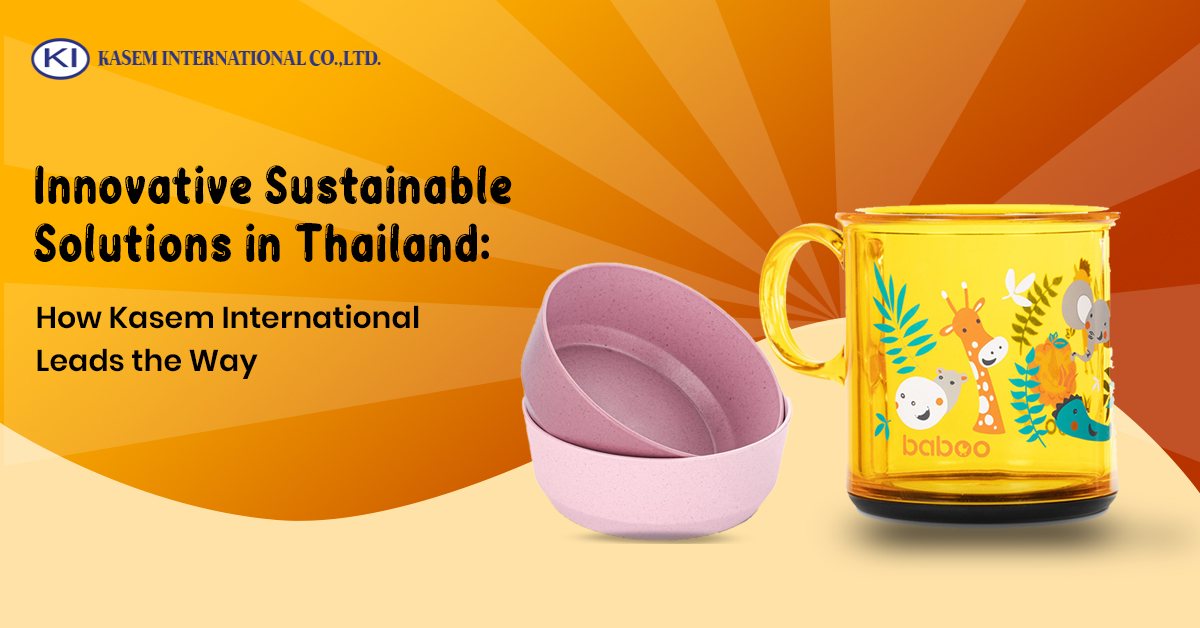

Innovative Sustainable Solutions in Thailand: How Kasem International Leads the Way
Global warming and climate change have become critical issues, leading to natural catastrophes that endanger both human life and the environment. As the world grapples with these challenges, the importance of sustainable and eco-friendly practices becomes paramount, even in the manufacturing of baby products.
This article will explore how Kasem International is at the forefront of implementing sustainable solutions in Thailand within the baby products industry, setting a benchmark for others to follow.
Sustainable solutions are crucial in today’s world to combat environmental degradation and ensure a habitable planet for future generations. These solutions focus on using resources efficiently, minimizing waste, and promoting renewable energy sources. In Thailand, Kasem International exemplifies these practices through innovative approaches in their manufacturing processes.
Essential Sustainable Solutions by Kasem International
Kasem International has adopted ten essential sustainable solutions in Thailand to enhance their baby product manufacturing:
1. Renewable energy:
Utilizing renewable energy Thailand to power manufacturing units reduces reliance on fossil fuels and decreases greenhouse gas emissions.
2. Green technology:
Implementing green technology Thailand ensures efficient resource use and reduces environmental impact.
3. Eco-friendly initiatives:
Promoting eco-friendly initiatives Thailand through sustainable sourcing and waste reduction practices.
4. Sustainable agriculture:
Supporting sustainable agriculture Thailand by using bio-based feedstocks in product manufacturing.
5. Waste management:
Implementing robust waste management Thailand to minimise waste and promote recycling.
6. Solar power:
Harnessing solar power Thailand for energy needs, reducing carbon footprints.
7. Environmental conservation:
Emphasizing environmental conservation Thailand to protect natural resources.
8. Climate action:
Taking proactive climate action Thailand to mitigate climate change effects.
9. Sustainable urban development:
Encouraging sustainable urban development Thailand through eco-friendly infrastructure.
10. Carbon reduction:
Focusing on carbon reduction Thailand to lower emissions from manufacturing processes.
Sustainable Materials for Baby Products by Kasem International
Kasem International has introduced innovative materials to manufacture various baby products, ensuring they are safe, sustainable, and eco-friendly:
1. Bio Plastic:
Derived from renewable biomass sources, these plastics are used to make baby feeding bottles, nipples, and pacifiers, reducing dependency on fossil fuels.
2. rPlastic:
Recycled plastic (rPlastic) is utilized for manufacturing spoonwares, tablewares, and dinnerwares, promoting circular economy practices.
3. Bio Degradable Plastic:
These plastics decompose naturally, making them ideal for products like plates, bowls, and glasses, thus minimizing long-term environmental impact.
Sustainable Solutions for a Circular Economy
Kasem International adheres to policies promoting a circular economy, focusing on:
1. Less fossil fuel:
Reducing the use of fossil fuels by incorporating more renewable energy and sustainable materials.
2. More bio-based feedstock:
Utilizing bio-based feedstocks to produce eco-friendly products.
3. Policy of take, make, reuse:
Encouraging the take, make, and reuse model to extend product life cycles and reduce waste.
4. Less carbon footprint:
Implementing strategies to minimize carbon footprints in manufacturing processes.
Commitment to Safety and Quality
Kasem International’s commitment to sustainability does not compromise product safety. All products, including feeding bottles, nipples, pacifiers, spoonwares, tablewares, dinnerwares, plates, bowls, and glasses, adhere to the highest safety standards. Consumers can purchase these products directly from their website, ensuring convenient access to sustainable and safe baby products.
Conclusion
Kasem International stands as a beacon of sustainable solutions in Thailand, showcasing how innovative practices can transform industries while addressing pressing environmental challenges. By incorporating renewable energy, green technology, eco-friendly initiatives, and more, they lead the way in sustainable baby product manufacturing.
Their efforts not only benefit the environment but also set a high standard for safety and quality, making them a trusted choice for eco-conscious consumers. As we continue to face global warming and climate change, such initiatives are essential for building a sustainable future.

 August 7, 2024
August 7, 2024